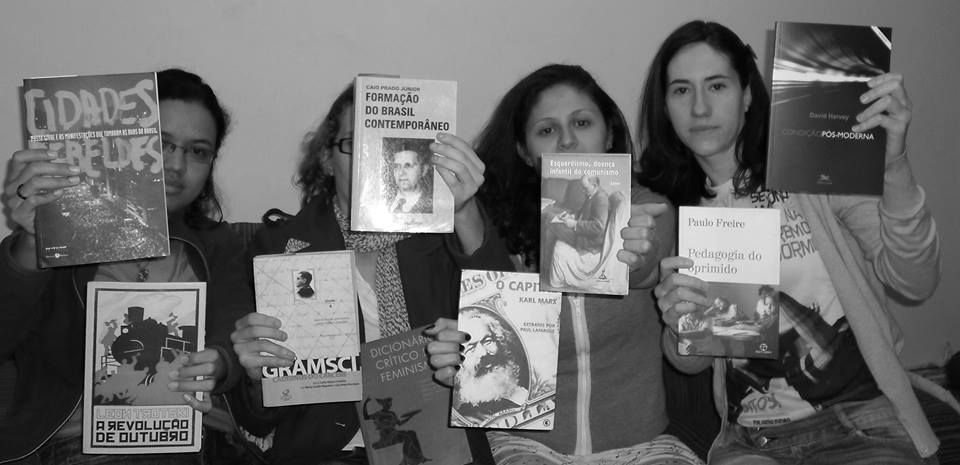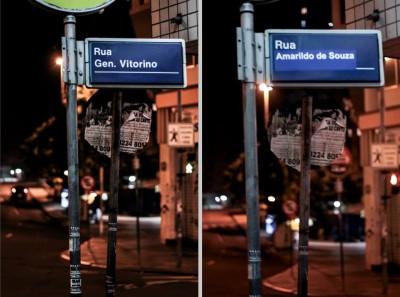 [1]
[1]A group of young women pose with some “subversive” literary works in protest against seizures at the house of protesters by the police. Photo from the album Subversive Books #RéuConfesso [1] by Carina Kunze on Facebook
[All links lead to Portuguese-language pages.]
In Porto Alegre, the capital of southernmost Brazilian state Rio Grande do Sul, the month of October began with police executing a search warrant on a cultural center and an urban settlement and seizing [2] activists’ books and computers.
In the early morning of October 4, 2013, a month that has become traditional in the calendar of national social movements, the Civil Police searched the two private residences as part of an ongoing investigation, which began in June, looking to identify “those responsible for the violent acts that have occurred at protests.”
The move, considered “within the rule of law [3]” by the current governor of the state, Tarso Genro, provoked reactions in support of the activists on the web. With the hashtag #RéuConfesso [4] (#ConfessedDefendant), social media users began to post photos in solidarity holding “dangerous” books.
Those who are currently under investigation claim that there is something more behind the operation, as the profile of the cultural center Moinho Negro [5], also searched by the police, reveals [6]:
O mandado policial deixa explícito que estão investigando as organizações políticas que de alguma forma estão inseridas nos protestos deste ano, tentando identificar (leia-se: forjar) uma formação de quadrilha para provocar supostos atos de violência nos protestos.
The warrant makes it clear that police are investigating the political organizations that are somehow embedded in this year's protests, trying to identify (read: forge) a conspiracy to provoke alleged acts of violence in the protests.
Lucas Maróstica [7], a social science student at the Federal University of Rio Grande do Sul (UFRGS) and member of the Coletivo Juntos! [8] (Collective Together!), also described on Facebook [9] the presence of police in his home:
Acabo de chegar de viagem, no aeroporto de Confins/MG recebi uma ligação desesperada da diarista do meu prédio avisando que a Policia Civil iria invadir meu apartamento e aprender meu computador.
Ainda não entrei em minha casa, mas pelos informes panfletos e adesivos também foram levados. Uma clara perseguição política ideológica por parte de um governo que se propunha ser diferente dos anteriores. (…)
I just returned from traveling; at the airport of Confins/MG [Minas Gerais state] I received a desperate call from the caretaker of my building warning that the Civil Police was about to invade my apartment and seize my computer.
I hadn't entered my house yet, but I'd been informed that pamphlets and stickers were also taken. A clear ideological political persecution by a government which claimed that it was different than previous ones. (…)
The police seized, among other things, Maróstica's personal computer and political philosophy books. On October 4, Maróstica, whose lawyer is the former member of federal parliament and daughter of the governor, Luciana Genro [10], was taken to be questioned by the police. After two hours of interrogation, he had access to the process that accuses him of “conspiracy, vandalism of public property, violent acts, ‘mass agitation’ [11].” According to the student activist, the criminal complaint against him does not present any concrete evidence against him, besides the testimony of a police officer who had identified him.
Matheus Gomes [12], another activist, who has also had searches conducted in his house, gave an official statement to police on October 9. Gomes vented [13] on his profile, placing the situation of social movements in Porto Alegre [14] into the national context:
Estamos diante da tentativa de transformar uma parcela importante dos sujeitos políticos que organizaram o Bloco de Lutas em criminosos. Eles querem dizer que somos parte de uma quadrilha, falaram que eu sou líder de uma facção criminosa. É isso que os governos e a polícia fazem com quem reivindica direitos sociais básicos como transporte, saúde e educação! Devemos nos atentar a escalada repressiva em curso no Brasil inteiro.
We are facing an attempt to transform an important group of politically active people who organized the Bloco de Lutas (Block of Struggles) [the movement that lead the protests of June and July in Porto Alegre] into criminals. They want to say that we are part of a gang, they said I'm the leader of a criminal gang. That's what governments and police do to those who are demanding basic social rights such as transport, health care and education! We must pay attention to the ongoing escalation of repression throughout all of Brazil.
This was not the first time this year that the Civil Police seized literary works during one of its operations. At the end of June, the Federação Anarquista Gaúcha [15] had a similar experience [16].
What's in a street name?
 [17]
[17]General Vitorino Street became “Amarildo de Souza (1965/1966 – missing in 2013)”. Photo shared on Facebook by Defesa Pública da Alegria.
In a time when military police are dealing with protesters in violent or heavy-handed ways, collective Defesa Pública da Alegria [18] (Public Defense of Joy) has found a peaceful and creative method of demonstrating for the demilitarization of the military police. The group was formed one year ago following a protest against the privatization of public spaces [19] for the sake of the 2014 World Cup. In that demonstration, protesters destroyed a gigantic inflatable “Tatu-bola [20]” (football armadillo), which is the symbol for the upcoming sporting event sponsored by Coca-Cola.
The day after the searches by the Brigade, residents woke up to find that some of the main streets of Porto Alegre, named after military figures, were reinvented with names in memory of “political activists and other victims of the repression of the state in Latin America [21]”. Among the names were journalist Vladimir Herzog [22], a victim of the military dictatorship, whose assassination was recently recognized by the government; Elton Brum, a member of the Movimento dos Sem Terra (MST) [23] (Landless Movement) who was assassinated [24] in 2009; and the mason Amarildo [25] [en], murdered inside a Pacifying Police Unit [26] at the Rocinha favela in Rio de Janeiro this year.
In such a tumultuous time for democracy, memory can be a powerful thing.